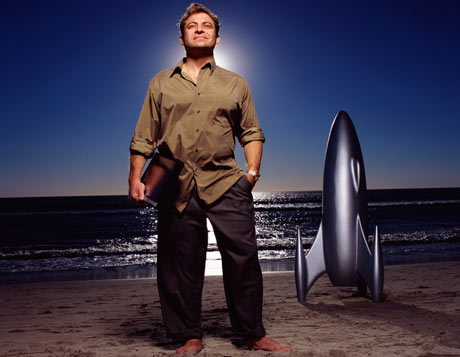
Take top thinkers from Silicon Valley and science, mix them with scientists, innovators and philanthro-capitalists, and you've got the Singularity University – on a mission to seek technological solutions to the world's great challenges
It's day one at the Singularity University: the opening address has just been delivered by a hologram. Craig Venter, who was one of the first scientists to sequence the human genome and created the first synthetic life form, is up next. And later, we will see two people, paralysed from the waist down, use robotic exoskeletons to rise up and walk.
But first, the co-founder of the Singularity University, Peter Diamandis, gives us our instructions for the day. Your task, he says, is to pick one of the "grand challenges of humanity" – the lack of clean drinking water, say. And then come up with an idea that "can positively impact the lives of a billion people".
It's 9.30 in the morning. Some of us haven't even had coffee yet. There's about 50 of us present and the room has been divided up into tables, one for education, another for poverty, another for water, and I'm not sure where I should sit. Diane Murphy, the university's PR executive, hesitates for a moment and then directs me over to the table marked "food". "Tell you what," she says. "Why don't you take Ashton Kutcher's chair over there. He's not coming until later." (When he does arrive, he pulls up a chair at the next table over. What can I say? If Ashton Kutcher fails to solve global hunger, it will be my fault.)
The Singularity University is really not much like a regular university. And not just because it's a place that manages to accommodate the likes of both Venter and Kutcher (and where, during a Q&A session, somebody asks a question about taking the Singularity University into the ghetto, and it turns out to be from the musician will.i.am).
Its courses aren't accredited, and it has no undergraduates. Stanford University might have been the cradle for a hundred Silicon Valley startups and the hothouse for some of its greatest technical innovations, but the Singularity University is an institution that has been made in the valley's own image: highly networked, fuelled by a cocktail of philanthro-capitalism and endowed with an almost mystical sense of its own destiny.
It is both Silicon Valley's elite future thinktank and its global outreach arm: Google and Microsoft both came to the founding conference and gave money, Nasa provided the campus space, and emblazoned across the website is a quote from Google's co-founder, Larry Page: "If I was a student," he says, "this is where I'd want to be." Its aim is "to assemble, educate and inspire a new generation of leaders who strive to understand and utilise exponentially advancing technologies to address humanity's grand challenges".
So, no pressure then. Although, of course, the easiest thing would simply to be British about all this and scoff. Ashton Kutcher! (I read later that he's been cast to play Steve Jobs in a forthcoming film and slightly suspect that he thinks he might actually be Steve Jobs.) A billion people! It's the kind of thing you can imagine someone in a white coat writing down as evidence just before they decide to commit you. What's more, Diamandis is the kind of can-do entrepreneur that, as a nation, we're inclined to lampoon and shun. (He's good friends with Richard Branson.)
The only problem with this as a strategy is that half the people in the room actually have done things which have had a positive impact on a billion people. Or, in some cases, more. Not just Venter, who has flown in on his private jet; there's also Vint Cerf, who is considered one of the fathers of the internet – he worked on Arpanet, the internet's predecessor – and is now "chief internet evangelist" at Google. And Sebastian Thrun, the man behind one of Google's latest and potentially most disruptive technologies yet, the self-driving car. He's also the head of the top-secret Google X lab, part of the firm that most employees didn't even know existed until the New York Times ran a piece on it last November.
And then, there's Elon Musk, the co-founder of PayPal and Tesla Motors, who created the world's first electric car, and is working on a replacement for the space shuttle. In the audience is Reid Hoffman, co-founder of LinkedIn. And Troy Carter, Lady Gaga's strategist. Later in the day, Buzz Aldrin shows up. He is, in this company, a genuine celebrity. All the scientists want to have their photo taken with him, and even Kutcher has the good grace to look a bit bashful. "What do you make of the Singularity University?" I ask Aldrin. "I'm a pretty high achiever," he says. "But I come here and think 'Gosh. I've just got to do better.'"
Continue reading - Guardian - Singularity University: Meet the people who are building our future
No comments:
Post a Comment